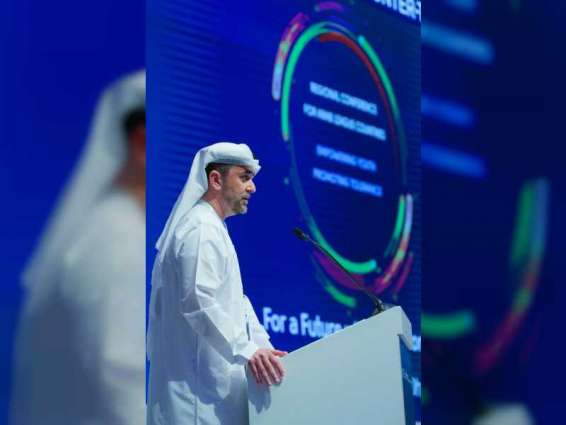ABU DHABI, (Pakistan Point News - 19th Dec, 2019) The Regional High-Level Conference on 'Empowering Youth and Promoting Tolerance: Practical Approaches to Preventing and Countering Violent Extremism Conducive to Terrorism,' co-organised by the UAE Ministry of Foreign Affairs and International Cooperation, the United Nations Office of Counter-Terrorism, UNOCT, and Hedayah, concluded today in Abu Dhabi.
Some 250 representatives from 32 Member States, various UN entities, international and regional organisations, and civil society partners discussed different approaches to strengthening resilience against radicalisation leading to terrorism.
The conference included three plenary thematic sessions: a High-Level Panel on Empowering Youth for Preventing and Countering Violent Extremism Conducive to Terrorism, PCVE; a High-Level Panel on Promoting Tolerance for PCVE; and the Youth Circle on enhancing partnerships between governments, youth, community and religious actors to promote tolerance and increase resilience to terrorist narratives.
The substance of discussions held during the one-day workshop preceding the conference and led by regional and international civil society organisations fed into these sessions.
Opening the conference, Zaki Nusseibeh, UAE Minister of State, highlighted the vital role of civil society organisations in empowering youth and promoting tolerance to prevent and combat extremism and terrorism. In this context, he underlined the need for enhanced partnerships and cooperation with these organisations to leverage their expertise in the development and implementation of a national and regional PCVE Action Plan.
In closing, United Nations Under-Secretary-General for Counter-Terrorism Vladimir Voronkov thanked the UAE Ministry of Foreign Affairs and International Cooperation and Hedayah for co-chairing the conference and all participants for their fruitful discussions and exchange of innovative ideas. He announced that on the sidelines of the conference, UNOCT and Hedayah signed a memorandum of understanding to strengthen cooperation.
The Under-Secretary-General also acknowledged the participation of Peter Sztaray, State Secretary for Security Policy of Hungary, and Fatima Benoughazi from the Young Leaders Council of Tangier, as well as a number of senior UN officials, including Yury Fedotov, Executive Director of UNODC; Jayathma Wickramanayake, United Nations Youth Envoy; Adama Dieng, UN Special Adviser on the Prevention of Genocide; and Miguel Angel Moratinos, High Representative for the United Nations Alliance of Civilisations.
On behalf of the co-chairs, the Under-Secretary-General presented the key conclusions of the conference and a vision for the way forward. He stated that conference participants agreed that the threat from Daesh, Al Qaeda, and other terrorist groups remains acute and widespread and underlined the need to further strengthen international and regional cooperation, including the sharing of good practices and lessons learned to empower youth and promote tolerance.
"Tolerance is central to building cohesion and solidarity, tightening the social fabric of our societies. This is an essential bulwark against the corrosive spread of violent extremism," Voronkov said. "The journey of achieving tolerance must start with social inclusion and not stop until social cohesion," he added.
On behalf of the co-chairs, Voronkov stated that communities must build bridges and understanding to promote resilience and rejection of narratives that "demonise and dehumanise the other, including those that associate terrorism to any religion, nationality or ethnicity."
Based on the Youth Circle discussions, the Under-Secretary-General stressed, "We must do more to listen to youth perspectives and engage young people to help shape counter-terrorism policies and programs." He also underscored that placing victims of terrorism at the centre of prevention efforts sends a strong and powerful message that helps put a human face to the effects of terrorism while building resilient communities.
The conference called for holistic and inclusive approaches to preventing and countering terrorism, oriented towards action at the grassroots level. It also stressed the need for more meaningful and action-oriented engagement between governments and civil society, including community, religious, and non-traditional actors in promoting dialogue, mutual understanding, and peaceful co-existence in full respect of human rights.
"Let’s honour human rights and rule of law to build resilient societies for a shared future as global neighbours in this age of hyper-connectivity to prevent and counter terrorism," Voronkov concluded, highlighting that societies must invest in prevention and building social and institutional resilience to the scourge of terrorism.
The conference is the sixth in a series of regional conferences to be held around the United Nations High-Level Conference for Heads of Counter-Terrorism Agencies of Member States, which was first convened in New York in June 2018 by Secretary-General Antonio Guterres.
UNOCT is partnering with Member States in different regions to co-organise these conferences, which aim to strengthen regional counterterrorism cooperation and prevent violent extremism conducive to terrorism. The outcomes and recommendations of these conferences will feed into the second High-Level Conference, which will take place in New York in July 2020.




